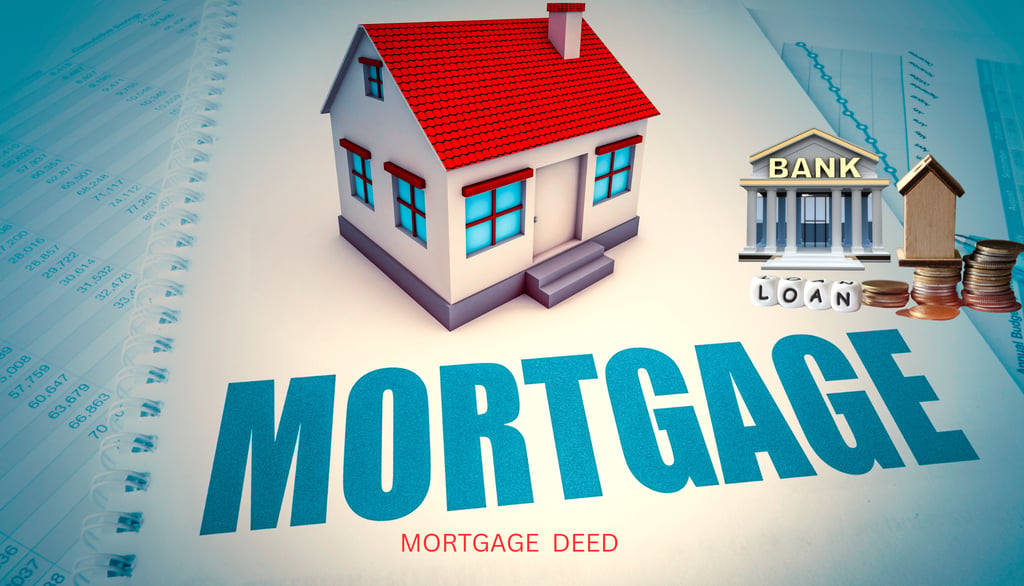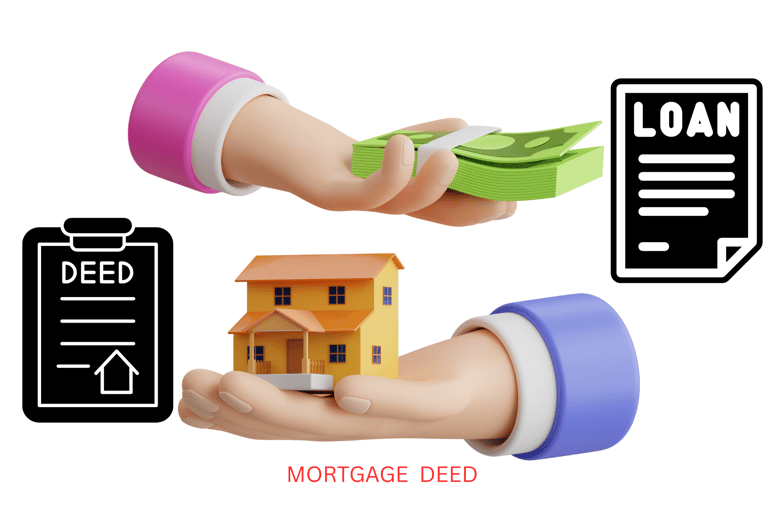What is a Mortgage Deed
A Mortgage Deed is a legal document through which a borrower (mortgagor) gives the lender (mortgagee) a right over their immovable property as security for a loan. In simple words, it is a written agreement that ensures the lender can recover their money if the borrower fails to repay.
FLIXAH DEVELOPERS
9/4/20254 min read


Mortgage Deed
Buying or investing in property often requires financial assistance, and for most people, this comes in the form of a loan. To secure such loans, especially from banks and financial institutions, lenders usually demand some form of collateral. This is where a Mortgage Deed comes into play.
A Mortgage Deed is one of the most crucial legal documents in property and finance transactions. It ensures that the lender has a legal claim over the property in case the borrower defaults on the loan. Understanding what a mortgage deed is, how it works, and why it is important can help both property buyers and investors make informed financial decisions.
This article provides a comprehensive guide on the concept, features, types, requirements, and benefits of a Mortgage Deed in India.
What is a Mortgage Deed?
A Mortgage Deed is a legal document through which a borrower (mortgagor) gives the lender (mortgagee) a right over their immovable property as security for a loan. In simple words, it is a written agreement that ensures the lender can recover their money if the borrower fails to repay.
The mortgagor continues to remain the owner of the property but transfers certain rights (like possession or sale rights) to the mortgagee, depending on the type of mortgage executed.
The document is executed under the provisions of the Transfer of Property Act, 1882, which governs all mortgage-related transactions in India.
Key Features of a Mortgage Deed
Legal Security for Loan
The primary purpose of a mortgage deed is to provide security to the lender.Immovable Property as Collateral
Only immovable assets like land, house, or buildings can be mortgaged, not movable assets.Conditional Transfer of Rights
The ownership rights are not completely transferred. Instead, the rights depend on the type of mortgage.Two Parties Involved
Mortgagor – The borrower who mortgages the property.
Mortgagee – The lender who gives the loan against security.
Repayment Condition
The property rights are restored to the borrower once the loan is fully repaid.
Why is a Mortgage Deed Important?
Protects Lenders
It provides a legal safeguard for lenders to recover their money in case of non-payment.Ensures Transparency
Written documentation avoids disputes and clearly defines terms of repayment.Enables Borrowers to Access Credit
By mortgaging property, borrowers can avail loans at relatively lower interest rates.Legal Recognition
A registered mortgage deed is legally enforceable in courts.
Legal Requirements for a Valid Mortgage Deed
For a mortgage deed to be legally valid in India, the following conditions must be fulfilled:
Written Agreement
A mortgage deed must always be in writing. Oral agreements are not valid.Registration
According to Section 59 of the Transfer of Property Act, any mortgage involving property valued over ₹100 must be registered with the Sub-Registrar.Stamp Duty
The deed must be executed on appropriate non-judicial stamp paper, and stamp duty is payable as per state laws.Essential Clauses
Loan amount
Interest rate and repayment terms
Details of the mortgaged property
Rights and obligations of both parties
Signatures and Witnesses
Both parties must sign the deed in the presence of at least two witnesses.
Types of Mortgages in India
Under the Transfer of Property Act, 1882, there are six types of mortgages:
Simple Mortgage
The mortgagor does not deliver possession but binds themselves to repay the loan.
If default occurs, the lender has the right to sell the property through court intervention.
Mortgage by Conditional Sale
Ownership is transferred to the lender on condition that it will revert to the borrower once the loan is repaid.
If the borrower defaults, the lender becomes the owner permanently.
Usufructuary Mortgage
The borrower delivers possession of the property to the lender.
The lender can use the property and enjoy income (rent, profits) from it until the loan is repaid.
English Mortgage
The borrower transfers ownership to the lender with a condition that the property will be re-transferred upon repayment.
Mortgage by Deposit of Title Deeds (Equitable Mortgage)
The borrower deposits original property title deeds with the lender.
Common in urban areas and often used for bank loans.
Anomalous Mortgage
Any mortgage that does not fit into the above categories or is a combination of two or more types.
Contents of a Mortgage Deed
A properly drafted mortgage deed usually contains:
Details of the lender and borrower
Loan amount, interest rate, and repayment schedule
Description of the mortgaged property (address, survey number, etc.)
Rights of the mortgagee in case of default
Borrower’s declaration of ownership of property
Clause regarding redemption upon repayment
Conditions of possession, if applicable
Signatures and witness details
Rights and Duties of Mortgagor (Borrower)
Rights:
Right to redeem property once debt is cleared
Right to transfer property with lender’s consent
Right to recover excess profits (if usufructuary mortgage)
Duties:
Obligation to repay principal and interest
Duty to maintain and preserve the property
Duty not to transfer property to third parties without consent
Rights and Duties of Mortgagee (Lender)
Rights:
Right to sell property if borrower defaults
Right to receive interest and loan repayment
Right to enjoy property income (in usufructuary mortgages)
Duties:
Return property/documents once loan is repaid
Avoid unnecessary expenses or damage to property
Transfer ownership back to borrower after repayment
Benefits of Mortgage Deed
Security for Lenders: Ensures repayment.
Access to Larger Loans: Borrowers can secure higher amounts compared to unsecured loans.
Flexibility: Different types of mortgages cater to varied borrower needs.
Legal Clarity: Minimizes disputes by clearly outlining terms.
Challenges and Limitations
High Stamp Duty and Registration Costs: Vary from state to state and can be expensive.
Risk of Losing Property: Borrowers may permanently lose property if they fail to repay.
Lengthy Legal Process: Recovery through courts can take time.
Market Value Fluctuations: Property value may reduce over time, affecting lender’s security.
Conclusion
A Mortgage Deed is a vital legal instrument in property financing. It not only secures the lender’s interest but also empowers borrowers to access credit using their immovable assets. By clearly defining the rights, duties, and terms of repayment, it minimizes the chances of disputes and ensures smooth financial transactions.
Whether you are a borrower seeking a home loan or a lender offering financial assistance, understanding the mortgage deed is essential. It is always advisable to draft the deed with the help of legal professionals and ensure proper registration and stamp duty compliance.
In the modern property market, where large investments and loans are common, the mortgage deed remains a cornerstone document safeguarding both borrower and lender interests.
FOR MORE INFO ON REAL ESTATE INVESTMENT PLEASE VISIT OUR WEBSITE flixahdeveloperspvtltd.com or you can also reach us @ +91 9100600730


